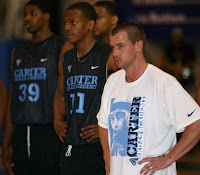Wednesday, December 1, 2010
Know Your Role
 Does every player in your program know what their role is? Are you sure?
Does every player in your program know what their role is? Are you sure?
A major factor in your team’s success is getting every player to:
-Know Their Role-Accept Their Role
-Have Pride in Their Role
Coach Jones takes a unique approach. Prior to our first game, he conducts a 15 minute meeting with every player and their parents. He offers his thoughts on their first 3 weeks of practice, he clearly defines their role on the team, he estimates how much playing time they will get, and he outlines his expectations.
He encourages each player to speak freely and voice any concerns. The parents are included to make sure nothing is lost in translation. The meeting isn’t adjourned until everyone is on the same page.
Coach Jones’ honesty, sincerity, and inclusion of the parents make this approach extremely effective. Here is another useful exercise to try with your team: Have every player write down the number of minutes they would like to play in each game. Collect everyone’s number and total them up.
In a standard high school game there are160 playable minutes available (32 minutes of game time x 5 players on the court at all times). I guarantee the number you total will far exceed 160 minutes. In many cases, it will be double. What does that mean? It means that most of the players want to play more minutes than they actually will (or are even possible!). They may have written down 20 minutes… yet realistically will play significantly less than that.
Discrepancies in playing time can become a major distraction if not handled appropriately.
While things can certainly change, it is important to clearly define each player’s role (including an honest estimate of playing time) to reduce the chance of it becoming an issue later in the season. Grumblings at the “end of the bench” can become a cancer to the team. Team’s that keep high morale and great attitudes at the “end of the bench”… are teams that will maximize their potential. They epitomize the word “team.”
While every player wants to start and wants to score points… that is not everyone’s role. There are so many ways players can positively impact a game… in limited minutes… that don’t make the newspaper.
Villanova’s men’s basketball program records the following on a board called “Attitude Club” after every game:
Extra pass (a pass that sets up an assist)
Screen assist (a screen that leads to an immediate score)
Tap backs (tapping a loose ball or rebound to teammate to gain position)
Quick outlets (getting the ball to a guard immediately after a rebound)
Shot contests (high hand on all shots)
Dives (getting on the floor for loose balls)
Deflections (disrupting the offense’s flow by getting a hand on the ball)
Paint passes (working the ball inside; hitting cutters and feeding the post)
Players that play limited minutes can still score highly in these areas. Players that don’t play at all can still do these things in practice (which will help earn time in the future). Whether you play 30 minutes a game, 3 minutes a game, or don’t play at all… make the most of every opportunity you have (even if it is in practice) and find a way within your role to contribute and make your team better.
One of my primary roles with DeMatha is to get our team mentally and physically ready to compete. Coach Paul Ricci has the same role at the University of Maryland.
Here is a video of their pre-game warm-up: http://TinyUrl.com/MDPreGameWarmUp
This is what they do prior to lay-up lines, passing drills, etc. This warm-up takes about 10 minutes.
Please keep me posted on how your team is doing this season.
I can be reached at:
Play hard. Play smart. Play together.
Alan Stein











Currently have 0 comments:
Post a Comment